Jonathan Gitlin
America needs to end its national love affair with massive cars. It’s unlikely to have escaped anyone’s attention that our cars, trucks, and SUVs keep getting bigger in each successive generation, a problem exacerbated as most automakers abandon smaller cars entirely in this market.
It’s easy to see why carmakers and car dealers like this problem—it’s not that much more expensive to build a large car compared to a smaller car, but you can charge a lot more for the bigger one, meaning more profits for them. It’s just the rest of us who suffer.
Bigger vehicles cost more, are less efficient, and while they better protect their occupants in a crash, they’re much more deadly on the receiving end. Heavier vehicles also wear out roads faster, though the difference between a small sedan and a large electric SUV amounts to very little when compared to the effect of a garbage truck rolling by each morning.
The last few years have seen the disappearance of most small cars from new car showrooms. Just this week, Automotive News reported that the Mitsubishi Mirage is on the way out, joining the choir invisible alongside cars like the Chevrolet Sonic, Honda Fit, and Toyota Yaris, all of which were once sold in the US. And with that, the subcompact class is effectively extinct now, bar the Mini.
At least there’s an electric version of the Mini, which is also one of the cheapest new EVs on sale, starting at just under $31,000.
Small cars are good for us, bad for business
Stepping up to the next-smallest class barely improves the situation. I’ve been a big fan of the Chevrolet Bolt ever since driving a prototype at CES in 2016, and Chevrolet says it will build (and sell) 70,000 Bolts this year. But it’s also on borrowed time—the Orion Assembly plant in Michigan that builds Bolts is being refitted so it can make Silverado EV trucks instead.
The Bolt’s biggest problem, from a bean counter’s point of view at least, was a battery that cost a lot more per kWh than one made with General Motors’ new Ultium cells. News of the Bolt’s cancellation was met with much dismay, and GM recently decided to bring the nameplate back at some unspecified time on a new Ultium-based platform. But GM CEO Mary Barra has also warned that even with the lower cost of Ultium cells, the company won’t make any profit on sub-$40,000 EVs until late in the decade.
That other small affordable EV pioneer, the Nissan Leaf, is also doomed. Currently in its second generation, the compact electric hatchback is set to be replaced with—yes, you guessed it—a smaller SUV instead.
In addition to the ever-escalating safety arms race that entices American car buyers, a misplaced obsession with having as much range as possible also factors in here. For example, a cynic might point out that the first version of the Silverado EV that will be built uses more kWh of lithium ion than three Bolt EVs.

